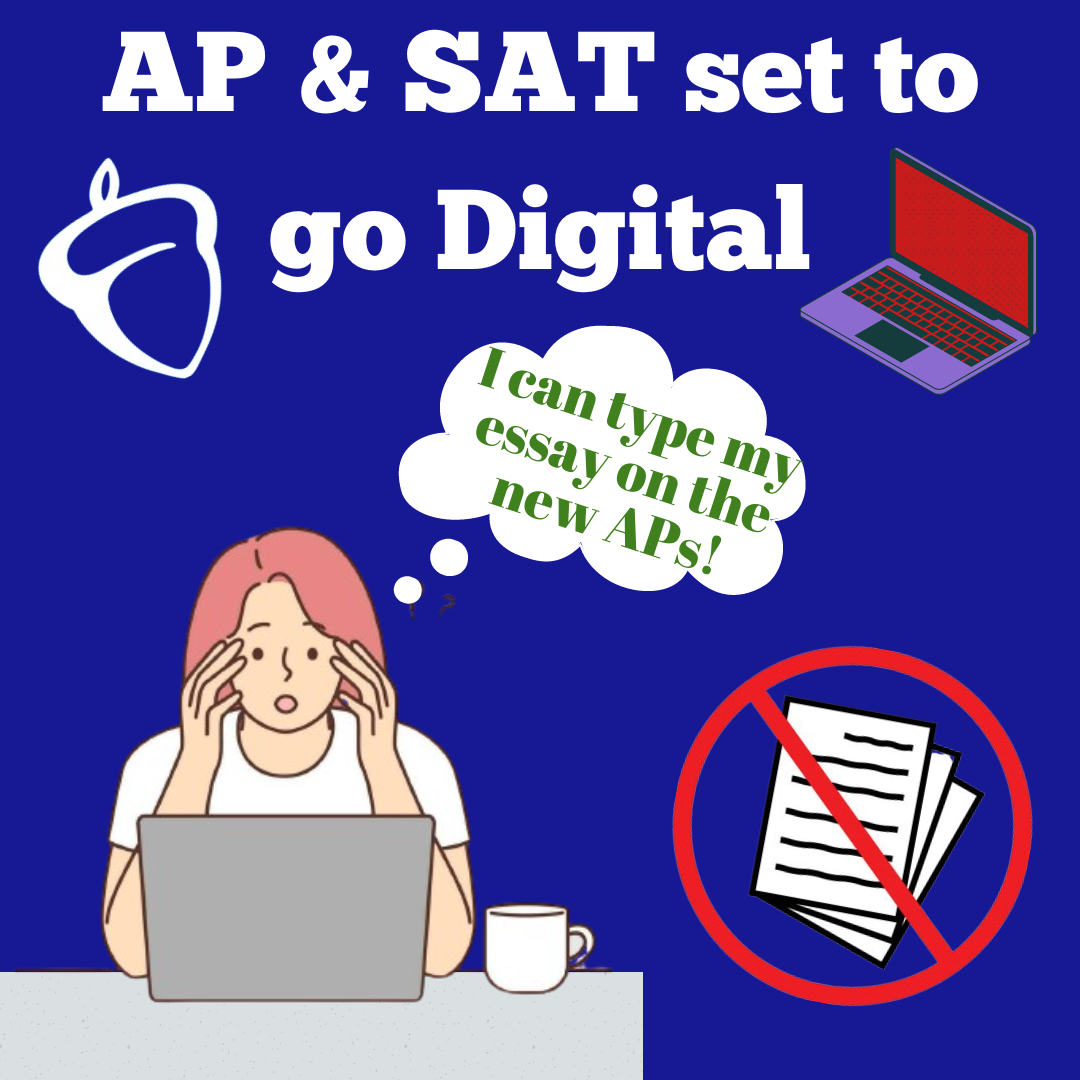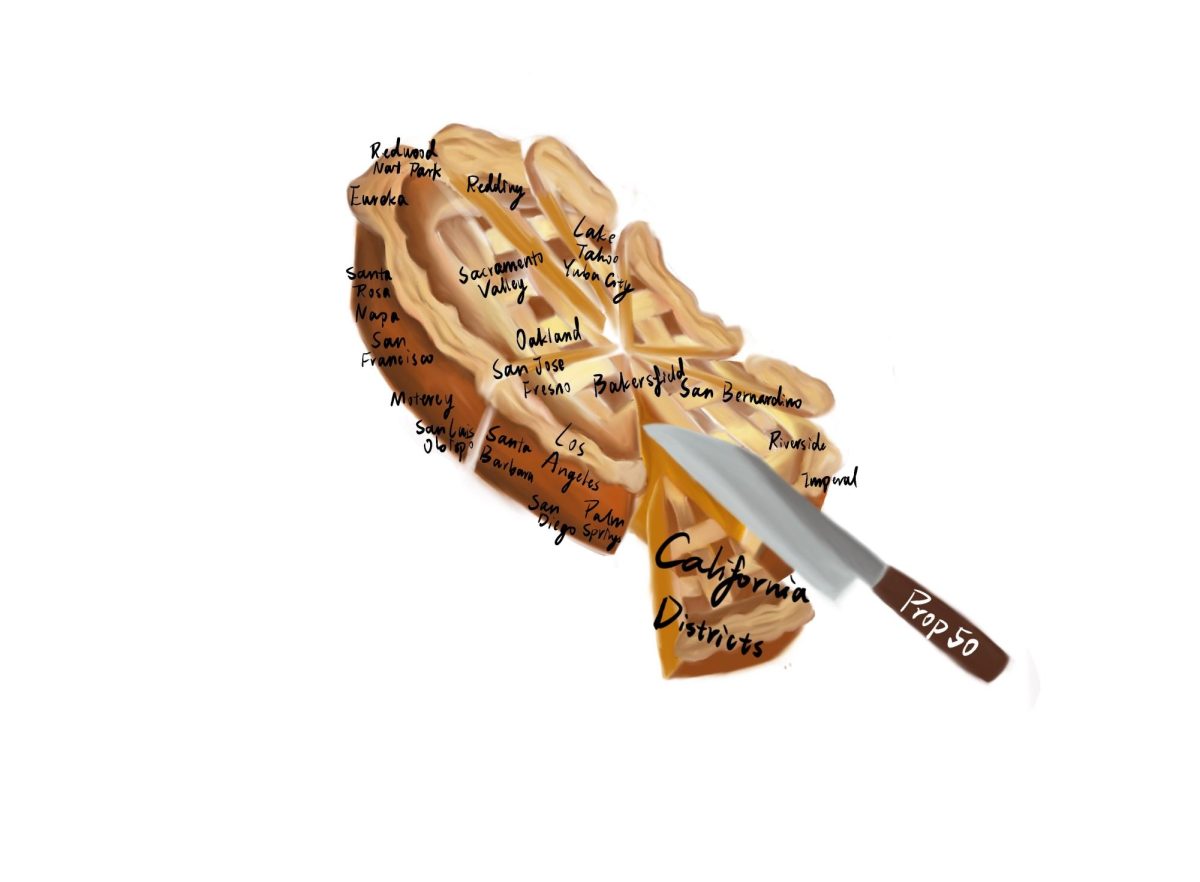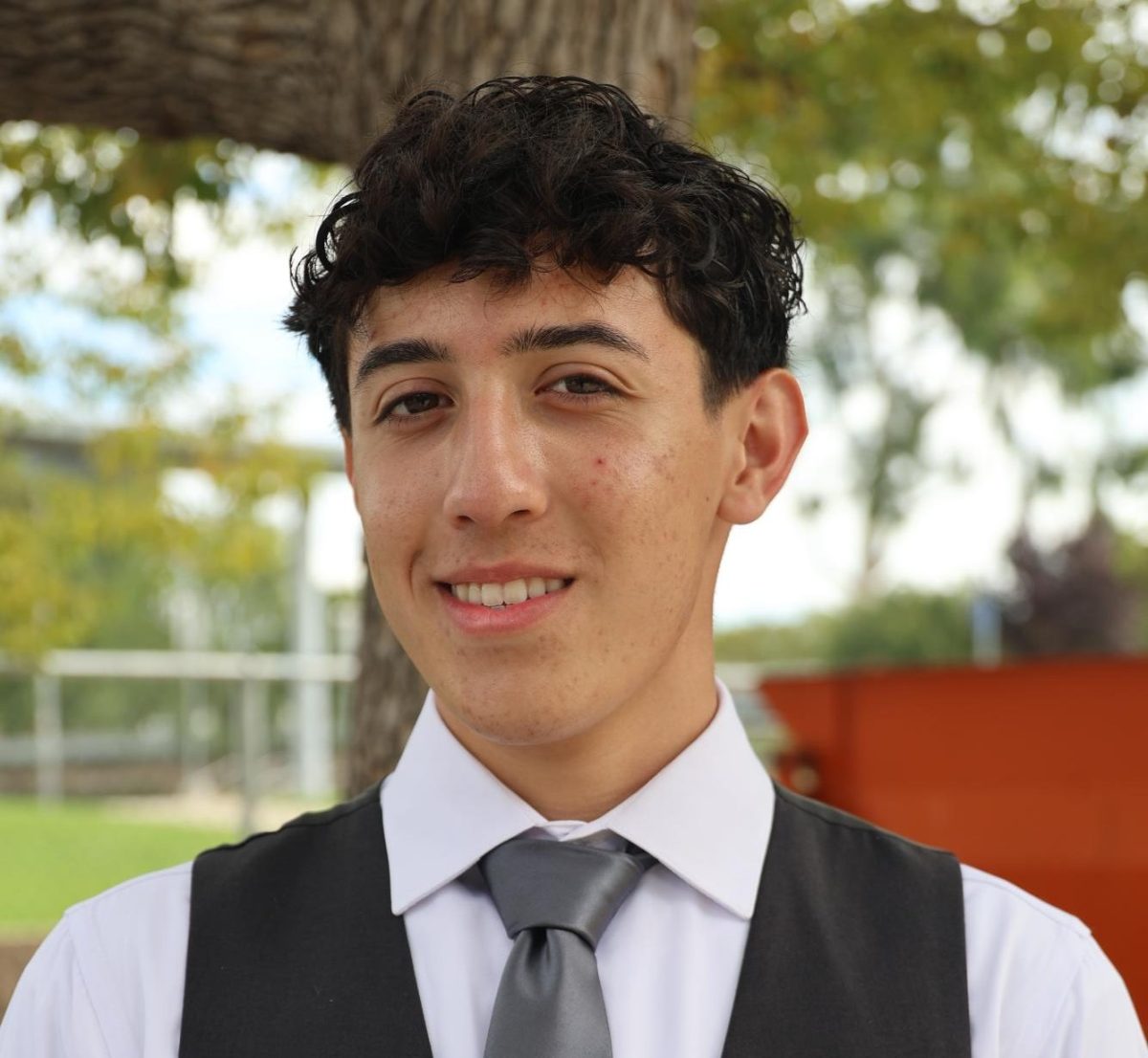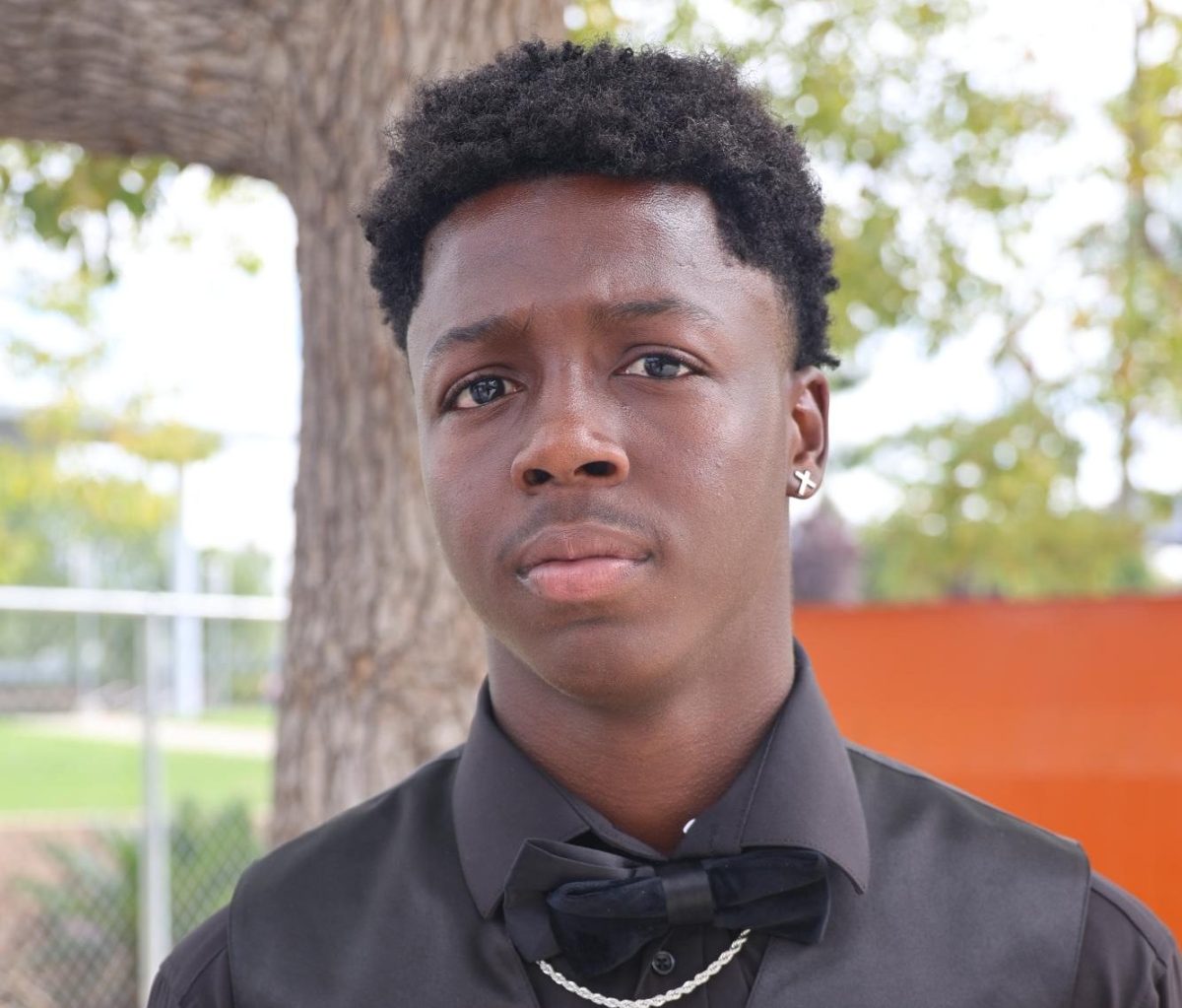After almost a century of students bubbling out A, B, C, and D on their sheets, the College Board has decided to say good riddance to paper and pencils and hello to the modern era of digitalization of computers and tablets.
Since COVID-19, digital tests such as the SAT, ACT, and AP tests have all been questioned about whether or not they would be digitized. In January 2022, the College Board, the #1 organization in the country administering standardized tests, released a shocking announcement that the SAT would be going fully digital starting internationally in March 2023, and a year later, in March 2024, it would be digital in the U.S. The test was hit with significant changes, such as the shortening of passage lengths in the reading section, the morphing of both reading and grammar sections into one, the usage of Desmos throughout the math section, reduced time, computer-adaptive sections (the first sections’ performance sets the second sections’ difficulty), and unscheduled breaks. These changes have been both praised and criticized by students and professors alike all across the country.
A central argument as to why the SAT was changed to digital in the first place was to be a better fit for the current generation, the familiarity of using the new format, and reduced test-induced fatigue continuously fought for by students. Historically, the SAT has constantly been bashed for being an unfair comparison of someone’s academic potential and that a GPA (grade point average) is a better predictor of college success than the SAT or ACT. Many students have argued that it does not seem fair to base a student’s academic career on a single standardized test, an “outdated” way of testing students. The new changes to the SAT hope to be stronger and suited for the new generation.
The newest change made by the College Board, and by far the most interesting, is the decision to administer nine AP (Advanced Placement) exams digitally starting May 2025. The nine APs that will go digital in 2025 will be AP African American Studies, AP Computer Science Principles, AP English Language and Composition, AP English Literature and Composition, AP European History, AP Psychology and AP Seminar, AP United States History, and AP World History: Modern. In 2026, six more APs will possibly go digital: AP Art History, AP Comparative Government and Politics, AP Computer Science A, AP Human Geography, AP Latin, and AP United States Government and Politics. For mostly writing-based AP tests, this change could be revolutionary for test-takers who deal with cramps in their hands after vigorously writing essays, DBQs, FRQs, LAQs, and more. The thought of being able to backspace specific words and ideas in their essays instead of furiously crossing them out in pen and writing and rewriting entire paragraphs is an enormous change that will help students tremendously. For AP U.S. History teachers Dr. Arboleda and Mr. Barcelona, the thought of the AP test going digital makes them extremely curious about the changes the College Board will implement.
“I think it will be wonderful for kids as long as they still have notepaper to take notes in for free writing, and as long as that happens, I think it will be easier to get out a finished essay,” Dr. Arboleda said.
“It seems in education, everything is moving towards digital learning, and there are opportunities for more accessibility to students, which is amazing,” Mr. Barcelona added.
The digital exams will generally share the same format and rules as the paper exams and the timing of each exam. The College Board has used a Bluebook application to allow students to take the AP and SAT tests digitally. An incredible feature of the application is the sheer amount of tools students can access, such as strikethrough, highlight, and other annotating tools within the various sections. According to the College Board, a massive benefit from the AP tests going digital is the prevention of loss of examination booklets as well as a possible reduction in cheating among students.
However, even with all the added benefits, when the SAT digitalization headed to CHS students on March 9th, many complained about the difficulties of the computer-adaptive sections. Students from all over the country complained about the level of difficulty of the math problems in their adaptive section and did not have enough time for the more difficult questions.
Although not going digital, AP Physics 1, AP Physics 2, AP Physics C: Mechanics, and AP Physics C: Electricity and Magnetism have implemented significant changes in course revisions that will be implemented during the 2024-2025 school year.
With AP Physics 1, there will now be eight units in the curriculum instead of the seven units beforehand, and this unit is an addition to the AP Physics 2 curriculum, fluids. The test has been altered from the previous 50 multiple-choice questions to 40 multiple-choice questions (MCQs), and multi-select questions, where students must select multiple answers, have been removed. The time allotted for MCQs, previously 90, is now 80 minutes. An intriguing change is the FRQ, which will now be four free-response questions (FRQs), previously three, and all-new question types. For those who are unfamiliar, historically, each FRQ has a different type of analysis that has remained the same for years, and all of them have changed this year to ask about mathematical routines, translation between representations, experimental design and analysis, and qualitative/quantitative translation; however, to compensate, the time for the FRQs will now be 100 minutes instead of 90.
AP Physics C is one class at CHS, but students take two exams — first, Mechanics, and second, Electricity and Magnetism. Traditionally, each exam takes 90 minutes to test (with the block of time scheduled to be two hours), and both exams happen in the same exam block, with this year’s AP Physics C exams happening from 12:00-4:00 pm on Tuesday, May 14. However, with drastic changes to AP Physics C, the number of MCQs in each section has gone from 35 to 40, with the time allotment going from 45 to a whopping 80 minutes and the number of answer options decreasing from five to four. Additionally, the number of FRQs for each section has increased from three to four, the question types have changed to the same ones for AP Physics 1 and 2, and the time allotment has increased even more than the MCQ change — from 45 to 100 minutes. This means that the AP Physics C: Mechanics exam and the AP Physics C: Electricity and Magnetism exam will both go from 90 minutes to 180 minutes, doubling the time of the total exam and meaning that future AP Physics C test-takers will spend a total of eight hours taking physics exams. Obviously, both exams will not be able to occur in the same exam block anymore, and each exam will be in a different place on the schedule starting next year.
While these digitalization changes may seem unfair and harsh, the College Board has released various statements throughout these revisions that assure students were created to better communicate the skills necessary for each course and move into a digitalized format catered to this generation.
Out goes paper, In comes digitalization: AP & SAT goes digital
Donate to The Wolfpacket
$85
$500
Contributed
Our Goal
Hello there! Our goal is to provide relavent, engaging journalism for readers of all ages. Your donation will support the student journalists of the Wolfpacket at Claremont High School, and will allow us to purchase equipment, print our monthly issues, and enter in journalism competitions. We appreciate your consideration!
More to Discover
About the Contributor

Anna Jiang, Head Features Editor
Anna Jiang is a senior and the Head Features Editor of the Wolfpacket. In her fourth year on the Wolfpacket staff, Jiang is excited to create a memorable last year with the class and make pages she hopes to be proud of. Although still determining what to pursue career-wise, she is set on majoring in psychology, sociology, or even child development if her college of choice permits. She loves listening to music in her free time, including her favorite artists’ new albums the hour they come out. She also loves watching re-runs of her favorite shows and occasional tennis matches if they are on TV. She also loves collecting Smiskis and hopes to get one of every character. One day, her dream is to watch Wimbledon or the US Open in person and see her favorite players. As she embarks on her final year at CHS, she is both nervous and excited to leave Claremont (potentially) and explore what’s out there in college.


















